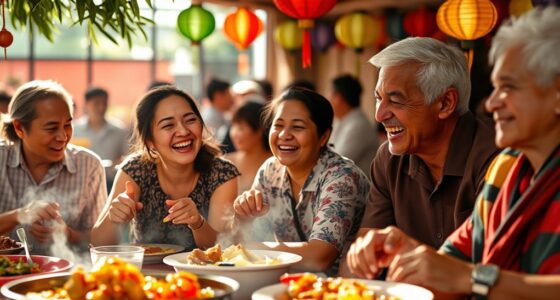Simbang Gabi strengthens Filipino relationships by bringing families together through nine days of pre-dawn Masses. You connect with loved ones over traditional meals and share stories that bridge generations. This festive practice fosters community unity, enhancing social ties among participants. The experience deepens spiritual growth, allowing you to reflect on shared faith and cultural identity. As you embrace the vibrant traditions, you’ll discover even more about how Simbang Gabi enriches your connections.
Key Takeaways
- Simbang Gabi fosters family bonding through shared experiences during the nine-day novena, enhancing emotional ties among relatives.
- Traditional meals served after Mass create opportunities for family gatherings and interactions.
- The processions and parol-making activities promote unity and collaboration among community members, strengthening relationships.
- Elders sharing stories during Simbang Gabi help bridge generational gaps, fostering understanding and connection within families.
- Participation in this cultural tradition fosters a sense of belonging and social cohesion, reinforcing relationships within the broader community.
Historical Significance of Simbang Gabi

As you explore the historical significance of Simbang Gabi, you’ll find that its roots trace back to the Spanish colonization of the Philippines in the 16th century. This tradition began to accommodate farmers, with pre-dawn Masses allowing them to worship before starting their workday.
Although it formally started in 1669, its evolution throughout the centuries shaped it into a crucial cultural and religious practice. The tradition faced challenges, including a temporary halt due to a decree against native hymns, yet it persisted and thrived.
Strengthening Family Bonds Through Tradition
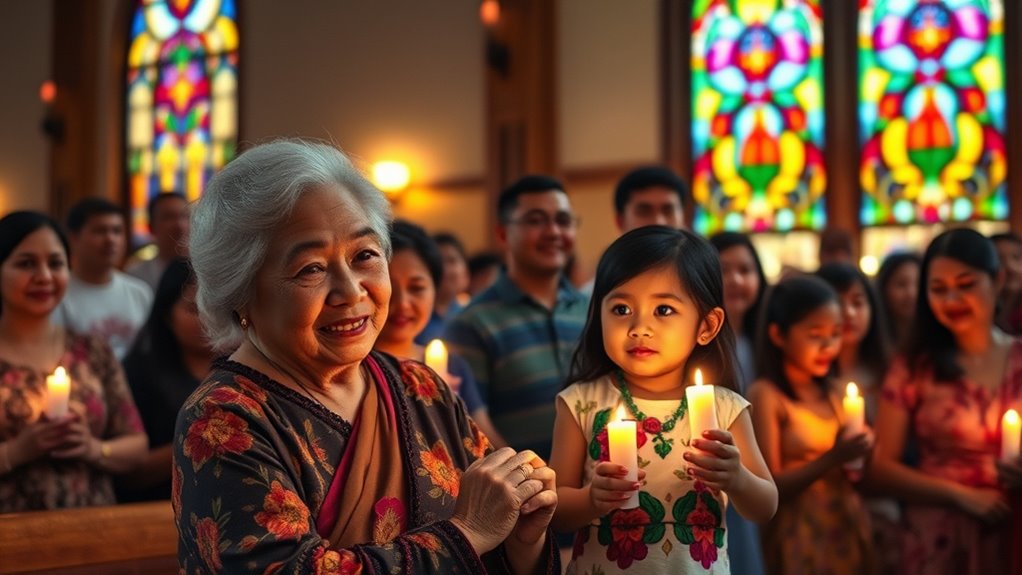
Simbang Gabi not only holds historical significance but also plays an essential role in strengthening family bonds through shared experiences and traditions.
You’ll find that participating in the nine-day novena fosters a deep communal and spiritual connection within your family. Gathering for traditional meals, like *picadillo* and *puto bumbong*, enhances interaction and celebrates your cultural heritage.
As you process with *parols* and offer gifts during Mass, unity grows among family members. Elders share stories, bridging generational gaps and ensuring cultural continuity.
Each year, Simbang Gabi creates lasting memories and strengthens your family’s emotional ties, reminding everyone of the importance of shared values and traditions.
This annual event nurtures a sense of belonging, enriching your family life.
Community Unity and Social Cohesion
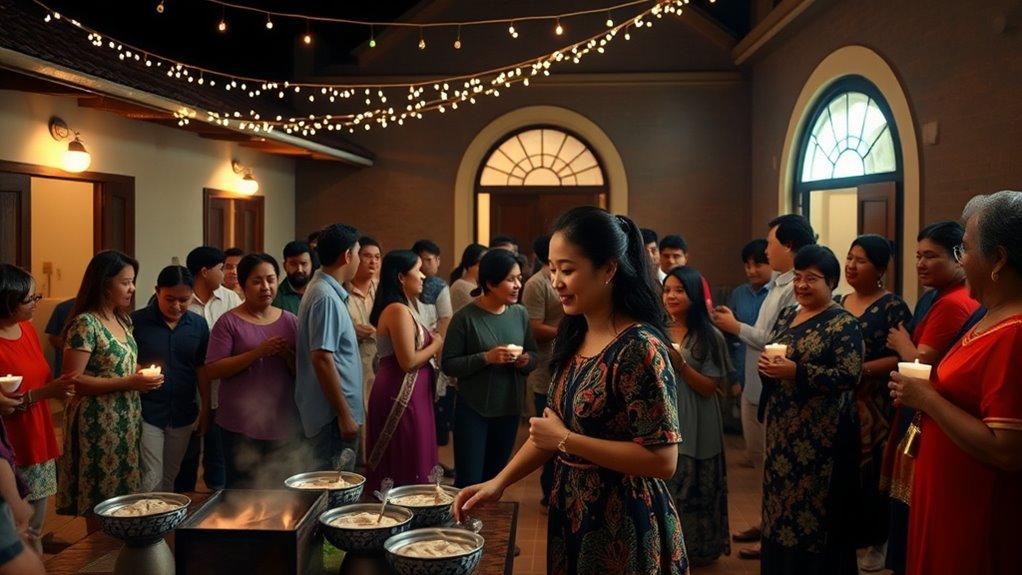
While participating in Simbang Gabi, you’re not just attending a series of Masses; you’re becoming part of a vibrant community that thrives on shared faith and cultural traditions.
This deeply rooted Filipino practice fosters unity, bringing people together through shared religious experiences. After each Mass, the social gatherings filled with traditional delicacies like bibingka and puto bumbong strengthen these communal ties.
No matter where you’re in the world, Simbang Gabi connects Filipinos, creating a sense of home among those far from their roots.
With centuries of history behind it, the tradition reinforces bonds, making community interaction a crucial part of this celebration.
You’re not only participating; you’re enhancing social cohesion and belonging within your community.
Cultural Traditions and Shared Experiences
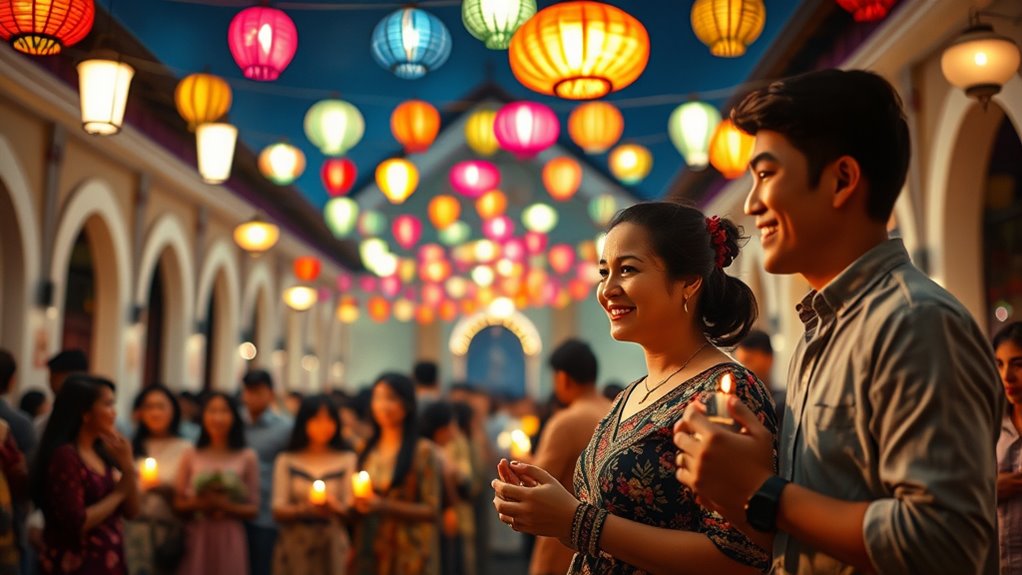
Participating in Simbang Gabi goes beyond just attending Mass; it immerses you in rich cultural traditions that define the Filipino Christmas experience.
You’ll see vibrant parols lighting up homes and streets, symbolizing the Star of Bethlehem, while indulging in traditional delicacies like bibingka and puto bumbong sold near churches.
The air fills with the sounds of classic Christmas carols, creating a festive atmosphere. Families gather to share these moments, strengthening bonds through shared experiences.
Communities unite under starlit skies, fostering interfaith harmony and collective devotion.
With reenactments and parish festivities following Mass, you engage deeply in the cultural heritage, making each celebration a meaningful experience that connects you to your roots and community.
Religious Devotion and Spiritual Growth

As you join the early morning Masses of Simbang Gabi, you immerse yourself in a deep spiritual journey that enhances your connection to the Christmas season.
This series of dawn Masses serves as a spiritual novena, focusing on devotion to the Virgin Mary. Each day, you strengthen your collective faith with fellow participants, fostering a sense of community and shared anticipation for Jesus’ birth.
You reflect on Mary’s journey, deepening your understanding of her role in your faith. Simbang Gabi encourages patience and joy, mirroring the experience of awaiting Christmas.
This nine-day observance not only renews your spirit but also connects you to Filipino traditions, reinforcing your cultural and spiritual identity across the globe.
Traditional Foods and Their Role in Celebrations

Simbang Gabi isn’t just a spiritual journey; it’s also a celebration of Filipino culture through traditional foods that enhance the festive atmosphere.
After the Mass, you’ll find delicious treats like bibingka, a smoky rice cake baked in banana leaves, and puto bumbong, a vibrant purple rice cake served in bamboo tubes. These dishes symbolize community and hospitality, inviting everyone to gather and share.
You might also enjoy suman, arroz caldo, and kutsinta, each offering a unique taste of tradition. The aromas and flavors evoke nostalgia, reminding you of family gatherings.
These foods not only satisfy your cravings but also preserve cultural heritage, fostering a sense of belonging and unity among participants during this cherished holiday season.
Global Celebrations and Cultural Adaptation
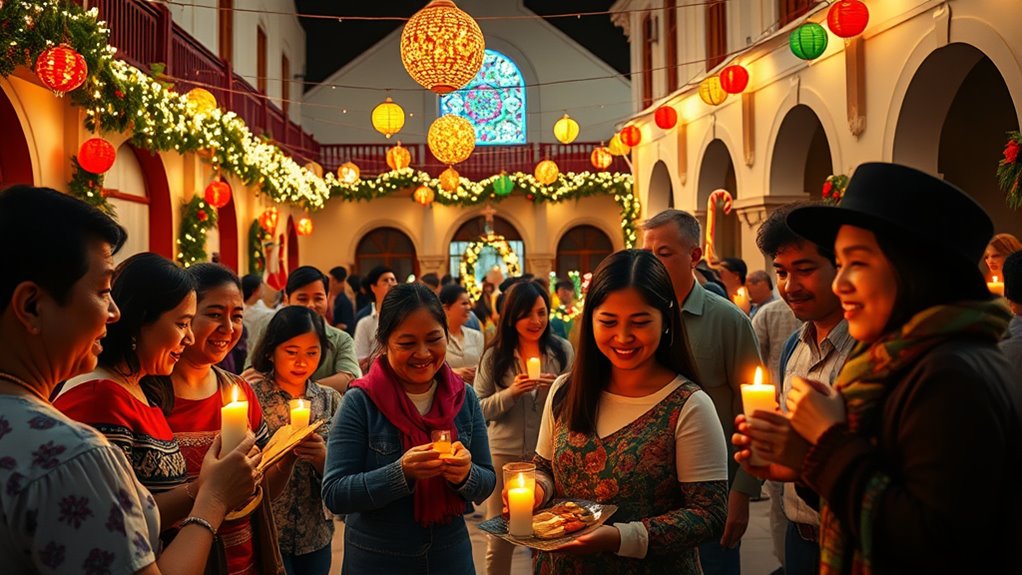
While many may think of Simbang Gabi as solely a Filipino tradition, its global expansion has transformed it into a celebration embraced by diverse cultures around the world.
Simbang Gabi has evolved from a Filipino tradition into a global celebration cherished by many cultures.
As Filipinos migrate, they introduce this cherished custom to new countries, where it’s often adopted by various Christian denominations. Celebrations now occur in churches, community centers, and even private homes, showcasing its global significance.
Despite these adaptations, the core practices remain, with local customs woven into the fabric of the event. Parol decorations and traditional music persist, enhancing the communal experience.
Inquiries from places like the United States highlight its growing international interest, fostering unity among Filipinos and Catholics worldwide as they celebrate this meaningful spiritual event together.
The Impact of Simbang Gabi on Interpersonal Relationships
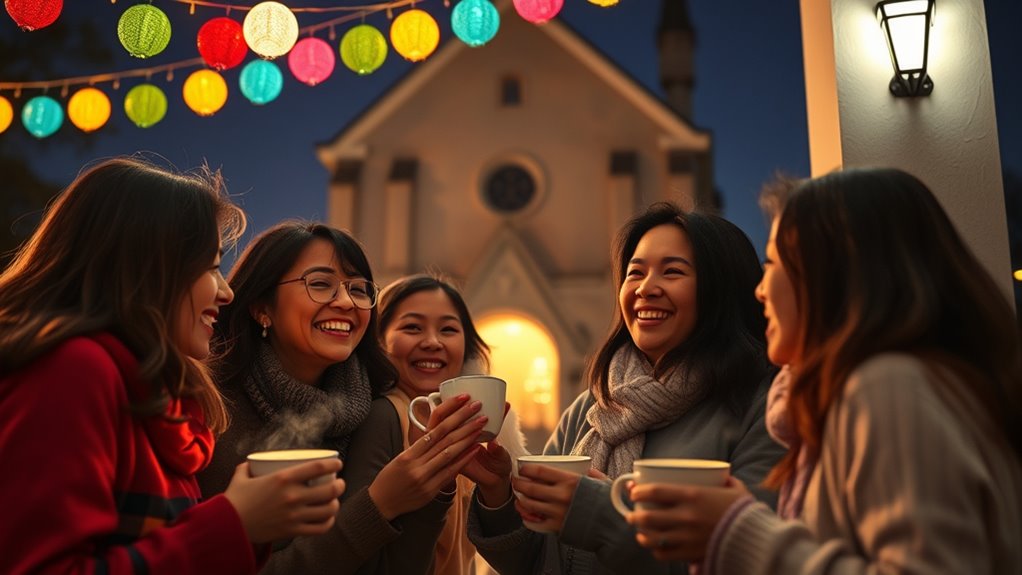
The global embrace of Simbang Gabi hasn’t only enriched cultural ties but also greatly impacted interpersonal relationships within communities. By attending Mass together, families strengthen their bonds, sharing a spiritual journey that deepens their connections.
This tradition fosters community engagement, bringing people together and reinforcing Filipino values of faith and family. After Mass, gatherings filled with traditional food and performances encourage social interaction, enhancing community spirit.
Simbang Gabi promotes interfaith dialogue, allowing diverse groups to connect and understand each other. As you participate, you’ll not only reflect on your faith but also build a supportive network, cultivating gratitude and appreciation that enriches your relationships.
Ultimately, Simbang Gabi serves as a beautiful reminder of connection and unity.
Frequently Asked Questions
How Does Simbang Gabi Influence Romantic Relationships Among Filipinos?
Simbang Gabi influences your romantic relationship by deepening your spiritual bond.
Sharing this tradition fosters emotional connections, as you both participate in prayer and reflection. It creates lasting memories through community involvement and shared experiences, reinforcing your commitment to each other and your heritage.
You’ll find comfort and support in the faith you share, which can help you navigate challenges together, ultimately strengthening your relationship and enhancing your sense of unity.
What Are Unique Family Traditions During Simbang Gabi Celebrations?
During Simbang Gabi, you’ll find unique family traditions that bring everyone together.
You gather for early morning Mass, often sharing food like bibingka and puto bumbong afterward. Families participate in processions, reinforcing bonds and celebrating culture.
You might also see parols lighting the way, symbolizing hope and joy. These traditions not only strengthen family ties but also preserve cherished customs, making each celebration a memorable experience for everyone involved.
How Do Children Participate in Simbang Gabi Activities?
During Simbang Gabi, you’ll see children actively participating in various activities. They process to the altar, bringing offerings like flowers and candles, while singing Advent songs.
They might also join choirs, sharing traditional Filipino hymns. Carrying star-shaped parols symbolizes the Christmas star, enhancing their understanding of the season.
After Mass, kids often engage with their community, enjoying traditional foods and forming bonds, which all deepen their cultural identity and spiritual connection.
Are There Specific Prayers or Rituals Associated With Family During Simbang Gabi?
Did you know that over 80% of Filipino families participate in the Simbang Gabi tradition?
During this nine-day novena, you’ll find specific prayers like the “Novena Mass” prayers that families recite together.
Rituals often include lighting candles, singing hymns, and sharing offerings.
These practices foster spiritual growth and unity. Engaging in these moments allows you to deepen your faith and strengthen connections with loved ones, creating a heartwarming experience during the holiday season.
How Do Different Regions in the Philippines Celebrate Simbang Gabi Uniquely?
Different regions in the Philippines celebrate Simbang Gabi in unique ways.
In Bicol, you might hear villacincos sung with traditional instruments, while Cebu showcases vibrant street performances.
Bohol often features pageants reenacting Joseph and Mary’s journey.
After Mass, you’ll enjoy local delicacies like bibingka and puto bumbong, fostering community bonding.
Each region’s distinct customs reflect their cultural heritage, making Simbang Gabi a rich tapestry of traditions across the archipelago.
Conclusion
Simbang Gabi isn’t just a series of early morning masses; it’s a beautiful blend of tradition, community, and personal growth that strengthens your relationships. You’ll find yourself reminiscing about shared meals and laughter, realizing how these moments bring you closer to family and friends. As you attend the celebrations, you might even bump into an old friend or discover a new bond over a favorite dish. It’s a reminder that love and connection thrive in shared experiences.





